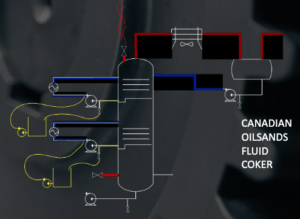Daryl Crandall - Refined Technologies EU B.V.

Traditional unit preparation for turnarounds involves two main step: decontamination and cleaning. The decontamination part of the process is to make safe the atmosphere in vessels and equipment, steaming and purging to the flare system, allowing for blinding and purging to the atmosphere. The cleaning portion is performed after the initial decontamination, using water circulation with chemicals to clean tower trays and internals, as well as heat exchangers and piping. The unit is then steamed again to the atmosphere to remove any residual explosive or toxic gases. Often, a pyrophoric oxidation step is added in equipment with suspected pyrophoric iron sulfides. A subsequent cleaning process is performed after the equipment has been opened and involves manpower to pressure wash or scrub remaining sludge, oil, waxes or solids.
This traditional method has some serious drawbacks:
- The entire process requires significant purging/steaming/draining to atmosphere. This results in significant amount of VOCs being released to the atmosphere, which are major smog and greenhouse gas contributors, as well as exposing personnel and the public to the venting gases.
- The effluent volumes generated can be enormous, and often require off-site disposal and treatment.
- The equipment is only partially cleaned, requiring “spot” cleaning after the turnaround has started.
- The duration of decontamination, cleaning, and subsequent cleaning steps can be excessive, and the quality can be unpredictable. This will adversely impact the turnaround schedule.
In 2015 and 2018, RTI worked with a Canadian Heavy Oil upgrader to eliminate the traditional shutdown, decontamination and chemical cleaning steps at their Fluid Coking Unit and replace with a vaporphase steam out to a completely closed system. This resulted in a savings of 76 hours, eliminated any post-shutdown cleaning, eliminated pyrophoric concerns, and allowed personnel, (for the first time), to work in the unit during shutdown, deinventory and chemical cleaning, without any exposure to draining or venting liquids or gases. Effluent volumes were less than 10% of those generated during water flushing. All effluent was reprocessed directly into the refinery slops system.
 Daryl Crandall is the Vice President – Operations for Refined Technologies, where he serves European and UK clients, helping them shutdown and clean their refinery units faster, safer and more reliably than traditional methods. Before joining RTI, Daryl worked for 22 years in the Canadian Oil Industry as an operations leader at companies such as Shell, Suncor and OPTI/Nexen. In his downtime, Daryl enjoys travelling, motorcycles, mountain biking and downhill skiing.
Daryl Crandall is the Vice President – Operations for Refined Technologies, where he serves European and UK clients, helping them shutdown and clean their refinery units faster, safer and more reliably than traditional methods. Before joining RTI, Daryl worked for 22 years in the Canadian Oil Industry as an operations leader at companies such as Shell, Suncor and OPTI/Nexen. In his downtime, Daryl enjoys travelling, motorcycles, mountain biking and downhill skiing.






